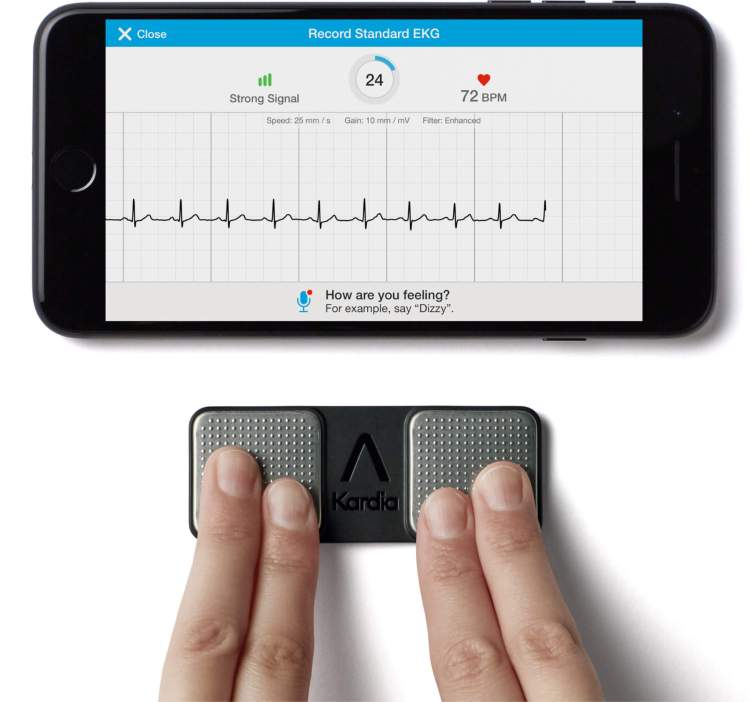Gadgets are fun to use, but they rarely get FDA clearance to be marketed as medical devices. AliveCor wants to change that with a tiny EKG monitor that connects to an app. The medtech company announced today that it has raised an additional $30 million in funding to help track heart-related conditions.
AliveCor’s Kardia Mobile is a sleek, credit card-like device that connects wirelessly to the Kardia app, which is available on both iOS and Android. Users vary, according to AliveCor CEO Vic Gundotra. “They are either people with or at risk of a chronic heart condition, individuals who have a family history of heart disease, or those who are simply health-conscious,” he wrote in an email to VentureBeat.
Users place their fingertips on the device’s electrodes to record their heart’s electric activity (movements of each chambers in the heart), which, according to AliveCor’s website, takes about 30 seconds. The EKG data is then transmitted to the company’s cloud service, where doctors can access the information.

Above: Example of AliveCor’s EKG recording data.
“A trained doctor can learn far more about your health from this EKG than just by looking at heart rate,” wrote Gundotra. “A cardiologist or electrophysiologist can see arrhythmias and other conditions that can lead to much more serious consequences if not diagnosed early and treated.” AliveCor uses AI to identify each user’s EKG and signal any irregularities to the doctor.
June 5th: The AI Audit in NYC
Join us next week in NYC to engage with top executive leaders, delving into strategies for auditing AI models to ensure fairness, optimal performance, and ethical compliance across diverse organizations. Secure your attendance for this exclusive invite-only event.
The FDA-approved device costs $100 and is sold on AliveCor’s website, as well as on Amazon. Gundotra declined to comment on the number of customers AliveCor has, but claims the company has recorded over 12 million EKGs to date. “We sell our products directly to consumers,” he wrote. “Half of our sales come from working with doctors to recommend the product to their patients.”
While traditional EKG recording devices — like the Holter monitor — are obvious competitors for AliveCor, fitness wearables could soon become a threat. Fitbit cofounder and CEO James Park spoke at a conference in December about his company’s plans to dive into medtech. Fitbit received considerable backlash over its allegedly failed attempts to accurately monitor people’s heart rates. But the company could also be seeking FDA approval soon and has already incorporated heart-rate tracking sensors into its Alta HR wristband.
Gundotra rejects the comparison to Fitbit. “We compete against the perception that we are a fitness device,” he wrote, “when in reality, AliveCor goes beyond wearables to deliver the next generation of tracking clinically validated data that helps consumers take an active role in monitoring their heart health.”
Medtech giant Omron Healthcare led today’s round, with participation from Mayo Clinic. Since it was founded in 2011, AliveCor has raised capital from investors that include Khosla Ventures, Bold Capital Partners, and Burrill Life Sciences Capital. The company would not disclose the total amount raised.
The new funds will be primarily used for hiring. “The company looks to expand its focus to include engineers with specialized skills, like AI,” wrote Gundotra.
Based in Mountain View, Calif., AliveCor currently has 50 employees.

